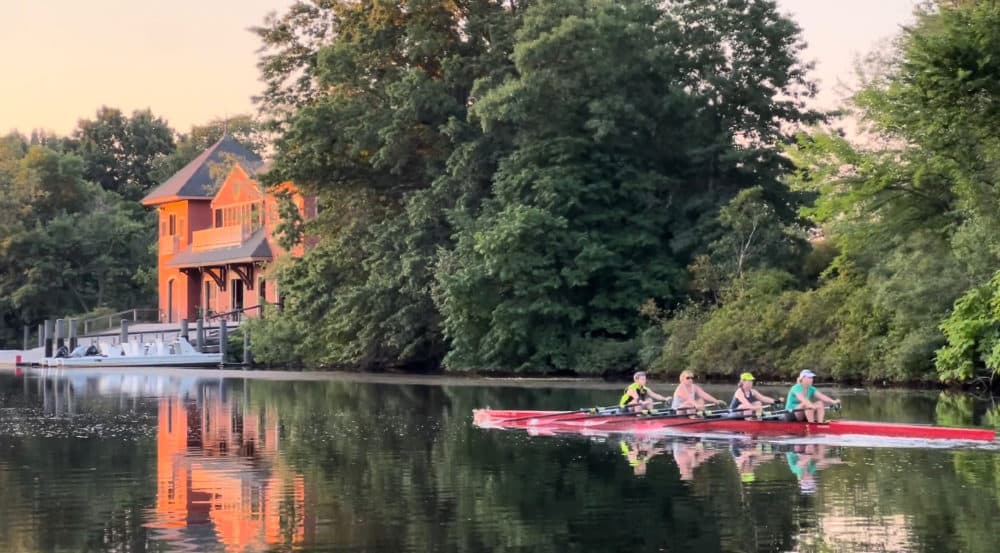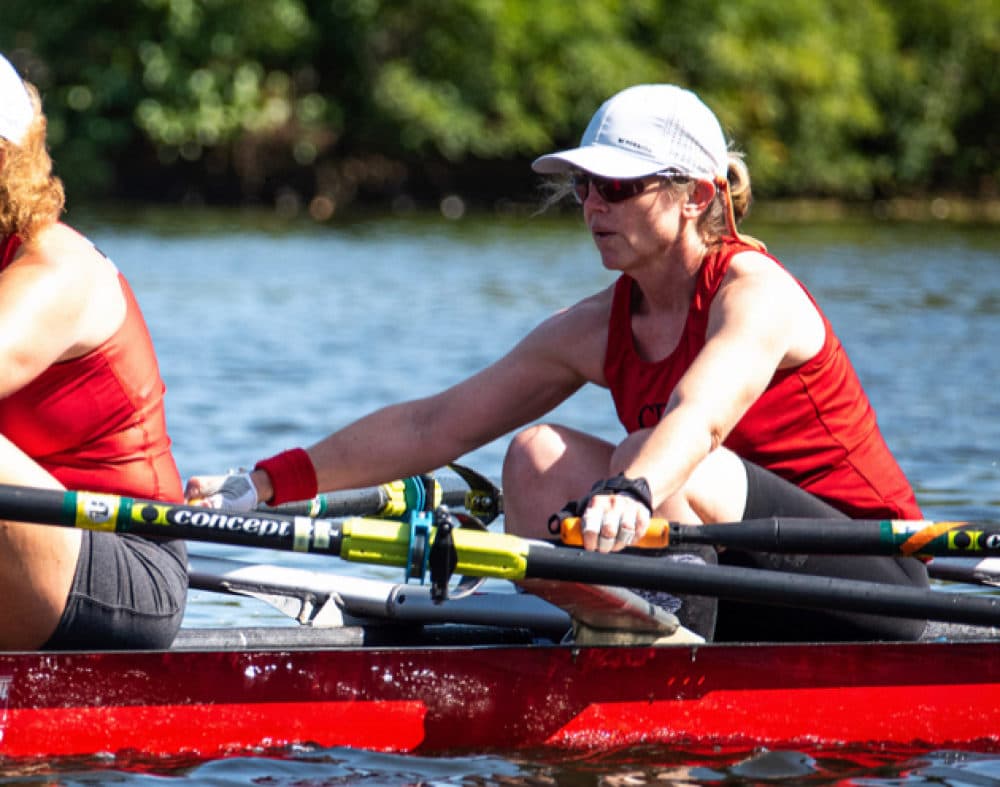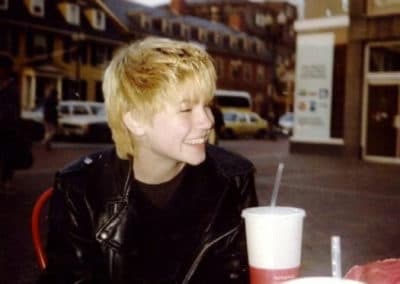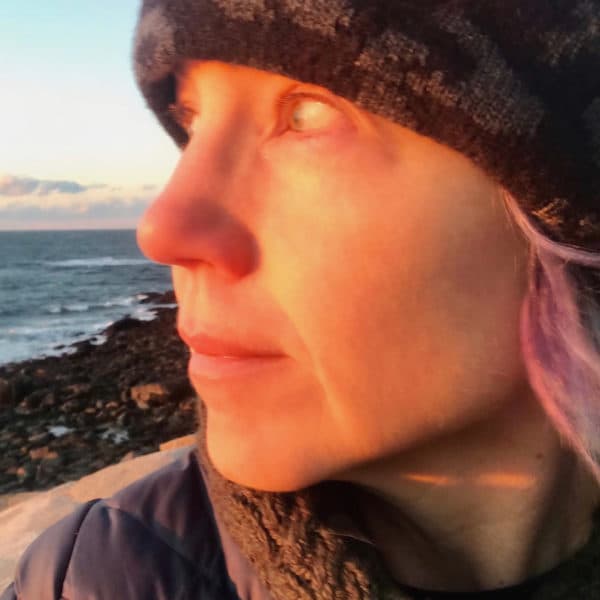Advertisement
Commentary
On the Charles River at dawn, we're all in the same 'Breakfast Club'

I was paralyzed: arms outstretched like a zombie in the dawn gloom, two long oars stabilizing me as I balanced on the forebodingly black water. While it was a fairly cold April morning on the Charles River in Boston, the only thing freezing my veins was panic.
“Don’t stop!” yelled my coach, who had just told me that there was a 96% chance that a new sculler — that would be me — ends up swimming. In the blur of instructions, it seemed I’d retained only that fact, and that this zombie pose was the safety position. But I was drifting toward a bridge.
I was 52. I’d never played a sport. One day, during the height of the pandemic, I held up the sole trophy I’d ever earned and discovered the plaque identifying me as “Class Actress” was missing. I was aghast. What was I now? Just…old?

Not long before I received that trophy, “The Breakfast Club” had come out. In that movie, five distinct characters bond during a Saturday detention. GenX teens like me internalized the theme that no matter how society tries to pigeonhole us, we aren’t that different. We are each a brain, a basket case, a princess, a criminal and a jock.
I’d achieved some version of most of these, but “jock” still seemed a reach. If I was free to fill in the blank on my trophy now, I realized, I should probably start "sportsing." This would be my route to inner harmony, clearly — and more importantly, not to feel so old.
I’d been loaned a rowing machine as the pandemic began, and by joining online challenges, I discovered a worldwide community of rowers of all ages and shapes, bonding in our mutual detention. I am about seven inches shorter than a typical rower, but after a year, COVID-19 restrictions had also begun to max my tolerance for life limitations. Unable to reach escape velocity on a rowing machine, I decided to learn to row on the water. This is how I found myself learning to scull.
I have associated port and starboard with my left and right hands since playing Shipwreck in grade school gym class. That day on the water, as the coach yelled instructions to turn the boat to avoid the bridge, my brain demanded a middle-aged moment to remap these terms for backward facing travel. So, I performed the necessary transformation: I renamed my hands. While rowing, I proclaimed my left hand: Salt (starboard), and my right hand: Pepa (port). I squared my oars, pressed against the footplate, and hummed the Salt-N-Pepa song, “Push It.” I began laughing and relaxed; I was in motion.
Advertisement
Bringing together all of my parts is resilience. And it’s fun.
I stayed with it, from beginner, to novice, to team boats, to three rounds of advanced sculling in which I progressed from being a problem child to feeling like I was flying. I began lifting weights to get more power from my short legs. I satisfied my inner nerd by learning about anatomy and studying technique. I talked about rowing to anyone who would listen. By spring I’d been asked to join three other women in a quad to train for competitions.
So, at 53, I am now competing against lifetime rowers and ex-Olympians. I’m not any younger or any taller, and I am still learning rowing vocabulary, but I have a lifetime of grit, a penchant for hard work and frankly, being a novice gives me some edge. I don’t just welcome, but crave input. And I know each race can show me how much I can improve.

Being a blank slate has had benefits. While others grieve for their past speedier selves, I am always faster than the last time I rowed. I also have years left to overstrain my body. If this results in my being able to win a race one day, it will be a miracle, but what’s in my corner: I feel amazing. I am outdoors more, have a team and have an outlet for all of my excess energy.
I do identify as a rower now, but also as a lifetime of other things. I can lose a race and my inner punk can find it hilarious that I just paid money to be given commands like a puppy in obedience school, in order to row down a section of the river I could row anytime.
As I get more fit, my age feels like wisdom, as long as I stretch first. I may have needed to be in my 50s to have the openness I have brought to the boat. Experience has taught me that if I show up in a new situation with humor, empathy and self-compassion — and give it my all? No one minds. Hell, they all feel good about sharing their expertise. And by continuing to show up and stay curious, and just act like a rower, I’ve become part of the tribe. The trajectory is familiar; it is after all, the plot of most young adult movies.
As I watch the sun rise over the river now, I smile at my boatmates in my current breakfast club. We have no societal prescriptions in the shell. It is up to us to work together well. When we get it right, the feeling of a fist in the air is palpable.
The name of the game when I was 16 is no different than 53. This isn’t a transformation, and it isn’t just acting. Bringing together all of my parts is resilience. And it’s fun.
